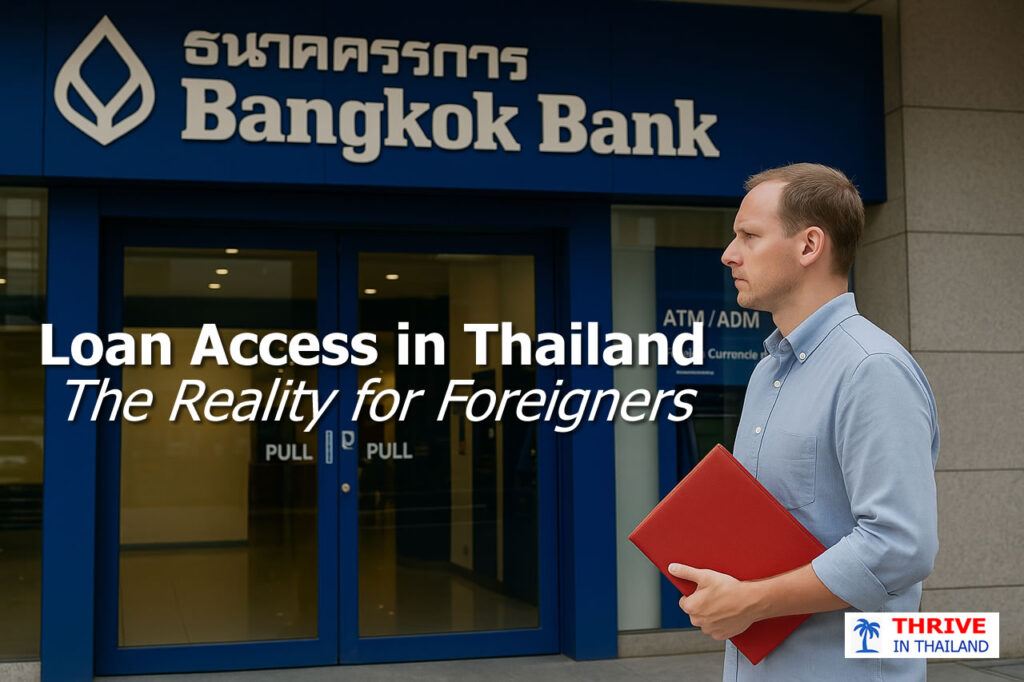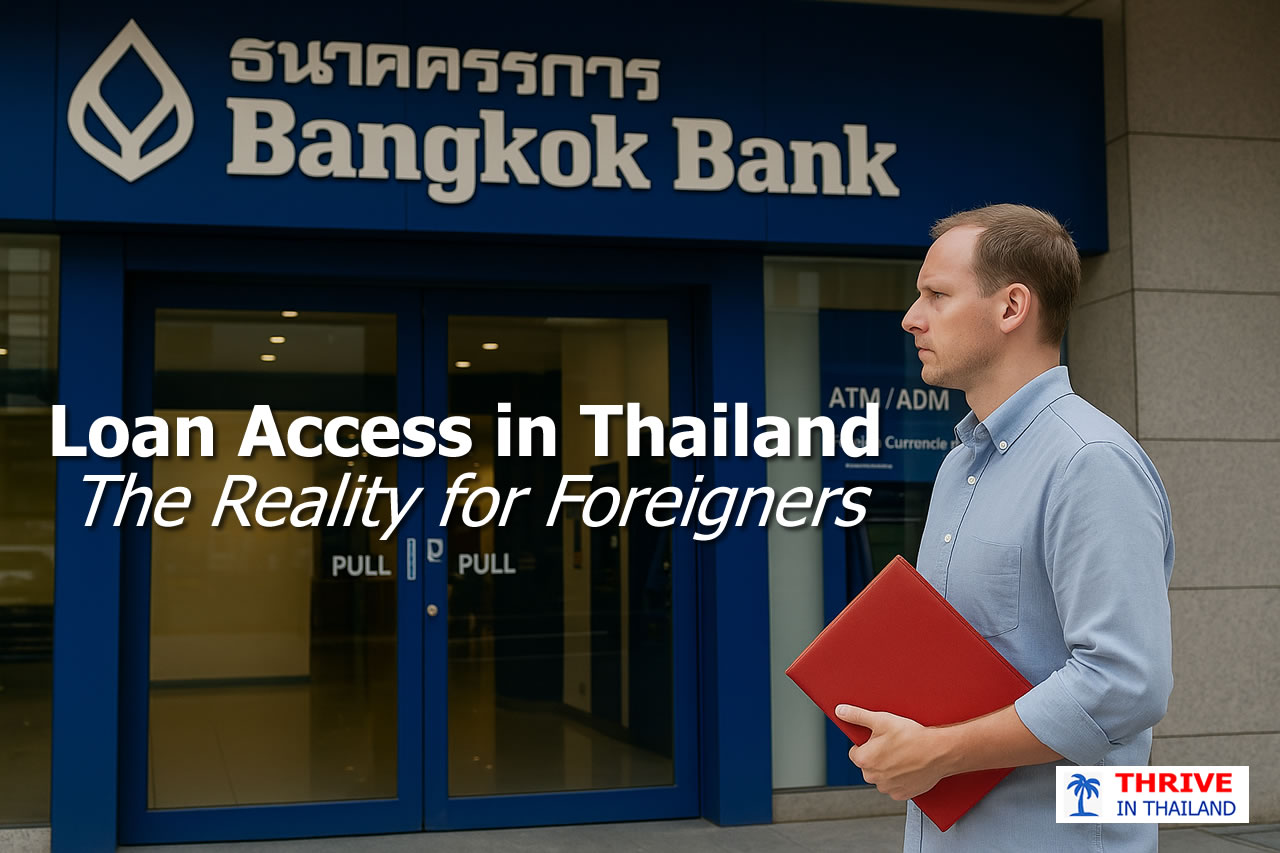
So, you’ve fallen in love with Thailand. Maybe you’ve found the perfect condo near the beach, or you’re eyeing that pickup truck that seems made for weekend trips to the mountains. The next logical step? Apply for a loan—right? Not so fast.
In Thailand, the lending landscape isn’t nearly as open to foreigners as you might expect. While banks and finance companies advertise loans left and right, most of those offers come with an invisible disclaimer: Thai citizens only. Even long-term expats with stable incomes and work permits often find themselves shut out of traditional financing options.
But that doesn’t mean it’s entirely off the table. Whether you’re looking to buy property, finance a car, or start a business, this guide walks you through what’s actually possible—and what’s just wishful thinking. We’ll look at what banks require, what alternatives exist, and why expectations need to be adjusted when it comes to borrowing in the Land of Smiles.
Over the years, I’ve met many foreigners who seemed to be rather confident about getting a loan here. Thinking that with their financial background, they easily will qualify for financing a new pickup truck or the purchase of a condo.
They assumed that the lending rules in Thailand are somehow similar to the system of the Western world. The sobering reality is that it is actually not easy at all for a foreigner to borrow money from a Thai bank. Nonetheless, it is not impossible. Let’s find out more…
Can Foreigners Get Loans in Thailand?
If you’re a foreigner living in Thailand and hoping to borrow money, the reality is that options are extremely limited. Thai banks are generally reluctant to lend to non-citizens, and in most cases, you’ll find that your application is denied—not because of poor credit or unstable income, but because you don’t fit into the standard risk model used by local institutions.
That said, the situation isn’t entirely black and white. While it’s true that most types of loans are out of reach for foreigners, there are a few narrow pathways—especially for those with long-term visas, a strong financial history in Thailand, and sometimes, a Thai co-signer. Let’s look at the main loan types and how they apply to foreigners:
Mortgages
Foreigners are legally allowed to own freehold condominium units, and a few banks do offer mortgage products for this purpose. However, approval is rare and comes with conditions:
- Large down payments (typically 30–50%)
- Proof of stable, locally sourced income
- Long-stay visa (Non-B with work permit, LTR, or PR)
- Solid deposit history with the same bank
These loans are usually offered only for condos, not for houses or land, which are restricted under Thai law.
Car Loans
Financing a vehicle is somewhat more accessible—especially if you have a work permit and a valid long-stay visa. Some banks and car dealerships will extend credit to foreigners, but expect:
- A larger down payment than locals
- Proof of local income and tax records
- A Thai co-signer (in many cases)
Without a work permit, even if you have significant income from abroad, approval is highly unlikely.
Personal Loans
These are typically not available to foreigners. Thai banks reserve personal loans for citizens and permanent residents. Even long-term visa holders are usually excluded unless they’ve worked in Thailand for years and built a local credit profile.
Business Loans
If you’re running a business through a Thai-registered company (majority Thai-owned), there are some options—mostly through commercial bank SME loan products. These are evaluated case by case and require:
- A clean business registration
- Thai majority shareholders
- Transparent accounting and tax compliance
- Personal guarantees (often from Thai partners)
Even then, the bank’s appetite for risk tends to be conservative.
What Banks Typically Require
Even in rare cases where Thai banks are willing to lend to foreigners, the bar is set high. The approval process is slow, documentation-heavy, and often subject to internal discretion that’s not clearly explained to the applicant. Still, it helps to know what you’re up against.
Here are the most common requirements banks expect from foreign applicants:
Long-Term Visa or Residency
Banks generally won’t even consider your application unless you hold:
- A valid work permit tied to a Non-B visa
- A Long-Term Resident (LTR) visa
- A permanent residency (PR) permit
- In very rare cases, an O-X retirement visa with extensive financial history
Short-term visas, tourist visas, or even retirement extensions (O) without local income are almost always rejected.
Proven Local Income
Foreign income—even if substantial—rarely carries weight unless it’s remitted regularly into a Thai account. You’ll typically need:
- Salary slips or tax records from a Thai employer
- Bank statements showing consistent local deposits
- A history of transactions showing spending and saving behavior in Thailand
Thai Co-Signer or Guarantor
Many banks require a Thai citizen—often a spouse or business partner—to co-sign the loan. This is a major roadblock for most foreigners, especially those living independently.
Even when not officially listed as mandatory, it can greatly improve your chances of approval.
Strong Relationship with the Bank
Some banks will only consider lending to foreigners if:
- You’ve banked with them for at least 6–12 months
- You have a fixed deposit or high balance account with them
- You already have an existing loan or financial product
Documentation in Thai
All documents, including translated income proof, employment contracts, and tax statements, must typically be submitted in Thai. Some banks may accept certified English translations, but Thai-language paperwork will speed things up and reduce the chance of rejection.
Banks That Might Offer Loans to Foreigners
While most Thai banks do not openly advertise loans to foreigners, a few institutions have been known to process applications under strict conditions—especially for condo mortgages or car financing.
It’s important to understand that policies can vary not only from bank to bank, but also branch to branch. Much depends on the discretion of the manager and the relationship you have with the institution.
Here are some of the banks where foreigners have occasionally secured loans:
Bangkok Bank
- Known to offer mortgages to foreigners, primarily for condominiums
- May consider applicants with long visa histories and local income
- Requires high down payments (30–50%) and a strong banking history
UOB (United Overseas Bank)
- Singapore-based, more open to international clients
- Offers some foreigner-friendly financial products, especially in urban centers
- Still requires extensive documentation and typically a Thai co-borrower
ICBC (Industrial and Commercial Bank of China)
- May offer mortgage products for foreigners purchasing condos
- More flexible for Chinese nationals or those with assets in Thailand
- Conditions vary by location and applicant profile
Government Housing Bank (GH Bank)
- May support loans in cases involving a Thai spouse or joint Thai ownership
- Not foreigner-friendly for solo applicants
- Typically tied to specific housing projects or state programs
Developer Financing (Not a Bank)
Some condo developers offer in-house financing directly to foreign buyers. These offers usually come with:
- Short repayment terms (1–3 years)
- Higher property prices (interest built into the price)
- Limited credit checks (but large initial down payments)
While not technically a bank loan, developer financing is often the only practical option for foreigners who need a payment plan.
| Bank / Lender | Loan Type | Foreign Applicant Conditions |
|---|---|---|
| Bangkok Bank | Condo Mortgage | Long-stay visa, local income, 30–50% down payment, good bank history |
| UOB | Condo Mortgage, Car Loan | Work permit, Thai co-signer preferred, case-by-case review |
| ICBC | Condo Mortgage | Favorable to Chinese nationals; asset ties to Thailand helpful |
| Government Housing Bank | Home Loans | Only for Thai co-ownership (e.g., with spouse); not foreigner-focused |
| Developer Financing | Direct Payment Plans | Short terms (1–3 years), large down payments, no credit check |
Challenges & Risks
Even if you meet all the bank’s requirements and find a branch willing to process your application, obtaining a loan as a foreigner in Thailand is rarely smooth sailing. For many expats, the process proves more frustrating than fruitful.
Here are the most common challenges and risks you should be aware of:
High Rejection Rates
Approval for foreigners remains the exception, not the rule. Even with a stable visa, solid income, and a banking history in Thailand, your application might still be rejected—often without a clear explanation.
Larger Down Payments
Foreigners are typically asked to provide higher upfront contributions than Thai applicants. It’s not uncommon for banks to request 30–50% down payments, especially on property or vehicle loans.
Foreign Currency Risk
If your income is earned abroad in a different currency (USD, EUR, AUD, etc.) and converted to Thai baht to repay the loan, you’re exposed to exchange rate fluctuations. A weakening home currency could make your monthly repayments more expensive over time.
Lack of Legal Protection
Foreigners borrowing from Thai institutions may find they have limited recourse if disputes arise. Consumer protection laws are not always enforced evenly, and legal processes may favor citizens or permanent residents.
Lengthy and Inconsistent Processing
Approval processes can drag on for weeks or even months. Requirements may shift mid-process, and communication can be inconsistent—especially if your documents are in English and need translation.
A very good friend of mine, who is married to a Thai, wanted to buy a house in Baan Wang Tan, a popular development in Chiang Mai. The idea was to renovate the place, add a pool, and put it on the rental market.
They own several condos in town, a pool villa on a large plot, and another 3 Rai = 4,800 sqm of land adjacent to the house they live in. All properties are paid in full, and no loans are registered to any of them. The 3 condos located at Twin Peaks and The Astra are rented out and creating income.
His Thai wife went to the bank to apply for a loan and never expected any problems. They have a long-established relationship with this particular branch of Bangkok Bank and know the manager. To their big surprise, the application was rejected!
The reason being, his wife is not employed and receiving a monthly salary that has been taxed, and the rental income from the condos does not count. Their assets worth over 30 Million Baht were not taken into consideration to guarantee the loan of only 2 Million Baht!
The entire process dragged on for over 2 months, with the bank coming up with even more additional requirements and giving them the runaround. Frustrated with the whole experience, they finally gave up.
At the end they borrowed the money to finish renovations from friends. The house was put on the market, and an agent quickly found a tenant (a Western family with 2 children) who committed to a 2-year contract paying substantial rent. After only 1 year, they already were able to satisfy half of the private loan and soon will enjoy the fruits of their investment in full!
Alternative Financing Options
If a traditional Thai bank loan isn’t realistic for your situation, you’re not out of options entirely. While these alternatives may come with limitations or trade-offs, they can offer a path forward—especially for expats willing to think creatively or compromise on terms.
Condo Developer Financing
Many condo developers in Thailand offer in-house financing plans to foreign buyers, particularly for new units. These plans usually include:
- Short loan terms (1–3 years)
- Large down payments (often 50% or more)
- No credit checks or income verification
- The financing cost is often built into the property price
This is one of the few financing options where being a foreigner isn’t a major disadvantage—but read the contract carefully and involve a property lawyer.
Offshore Personal Loans
If you have strong banking relationships in your home country, you may be able to obtain a personal or property loan offshore—and use the funds to purchase or invest in Thailand. Consider:
- International banks or lenders with a Thai presence (e.g., HSBC, Citibank)
- Home equity loans from property you own abroad
- Transfer fees and currency risk management – for tips on minimizing costs, see my Wise Review for Expats in Thailand
This method keeps the borrowing outside the Thai banking system but requires strong documentation and creditworthiness.
Thai Spouse or Partner Ownership
If you are married to a Thai national or share a long-term relationship, it may be possible to secure a loan in their name, with you contributing capital or co-managing repayments. Proceed with caution and legal safeguards:
- Draft a contractual agreement about contributions and ownership
- Ensure clarity around asset division in case of separation
- Avoid putting all financial control in someone else’s hands without legal protection
Lease with Option to Buy
Some property owners are open to long-term leases (e.g., 30 years) that include an option to purchase later. This avoids upfront ownership barriers and gives you time to settle in or arrange financing elsewhere. It’s especially common in less tourist-saturated areas.
Adjusting the Plan
Lastly, the most financially sound option may be to scale back the plan:
- Rent longer before buying
- Choose a less expensive property or location
- Reallocate funds to reduce or eliminate the need for credit
While not always exciting, it can keep your finances stable and flexible—two things you’ll value greatly if your situation changes.
Legal Tips and Due Diligence
Even if you’re lucky enough to secure financing in Thailand—or you go down one of the alternative routes—it’s essential to protect yourself legally. Lending in Thailand operates under a different framework than many foreigners are used to, and misunderstandings can be costly.
Here are some key legal considerations to keep in mind:
Always Consult a Thai Property Lawyer
Never rely solely on advice from developers, agents, or bank staff. Hire a qualified property or commercial lawyer who can:
- Review loan or sale contracts
- Check land titles and ownership rights
- Translate legal terms accurately
- Identify hidden fees, loopholes, or unfair clauses
This is especially crucial when financing involves a Thai spouse, joint ownership, or lease agreements.
Avoid Informal or Verbal Agreements
No matter how trustworthy a partner or agent may seem, always get financial agreements in writing, and preferably notarized. This includes:
- Payment schedules
- Ownership shares
- Co-investment terms
- Buyout or exit clauses
Verbal agreements carry little legal weight in Thai courts, and without documentation, you’ll have little recourse if things go wrong.
Don’t Use “Creative” Workarounds
Be wary of any scheme that promises an easy workaround—like holding property through a nominee, using fake employment contracts, or setting up shell companies. These may seem clever, but they’re often illegal or unenforceable.
In recent years, Thai authorities have cracked down on such arrangements, especially in the real estate sector.
Do a Title and Background Check
If you’re buying property, especially with seller financing, make sure the asset is:
- Properly titled in the Chanote system
- Free from encumbrances, liens, or hidden claims
- Owned outright by the seller or developer
Have your lawyer check with the Land Office and perform background checks if necessary.
Further Reading
If you found this article helpful, you might want to check out these related guides for more practical insights into finance and expat life in Thailand:
- Opening a Bank Account in Thailand
Step-by-step guide to setting up a Thai bank account—essential for daily life and financial transactions.
- How to Buy Property in Thailand
Everything foreigners need to know about purchasing property in Thailand, from contracts to ownership rules.
- Legal Property Ownership in Thailand for Foreigners
Understand which ownership structures are legally valid and how to protect your investment.
- Thailand Retirement Visa (O-A)
A full guide to long-stay retirement options, including financial criteria, renewals, and practical tips.
Thailand has taught me one important financial lesson: if you can’t afford to pay cash, you probably can’t afford it here at all. I’m not saying loans are impossible—but they come with strings, conditions, plenty of red tape, and a lot of frustration.
If you’re planning your life here relying on a loan to make your plans work in Thailand, you might want to rethink the plan. That said, living within your means here doesn’t have to be a limitation, and maybe a simpler, more flexible lifestyle can offer far more freedom than you might be used to back home.

Founder of Thrive in Thailand
Long-term expat living in Thailand—sharing culture, insights, and real-life farang wisdom, one story at a time!
This is a topic many expats struggle with—feel free to ask, comment, or share your own journey below. It helps others more than you think.


Very good article. I can fully sympathise with your friend as we experienced a similar situation. It can be very frustrating but on the positive side it avoids you going into debt with institutions. It forces you to be more diligent knowing that credit is not available.
Thank you for your comment and for sharing your experience! You’re absolutely right: while the lack of credit access can be frustrating, it does shift your mindset toward financial diligence. It’s one of those quiet lessons Thailand teaches you. I’m glad the article resonated with you, and I hope Thailand continues to treat you well.